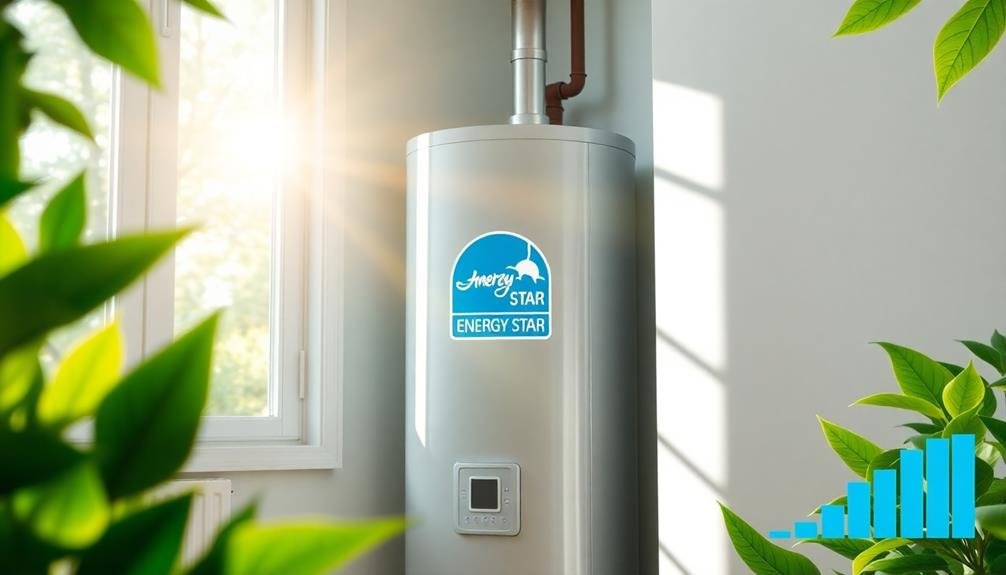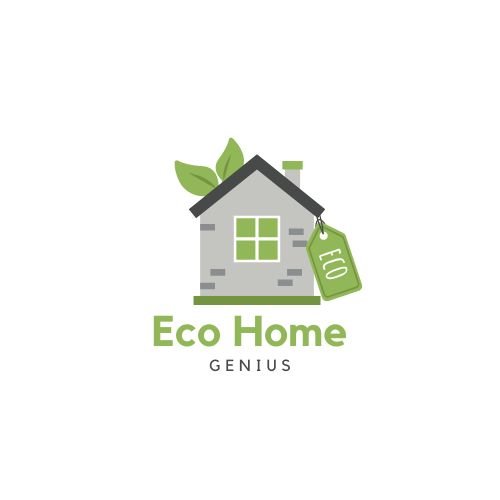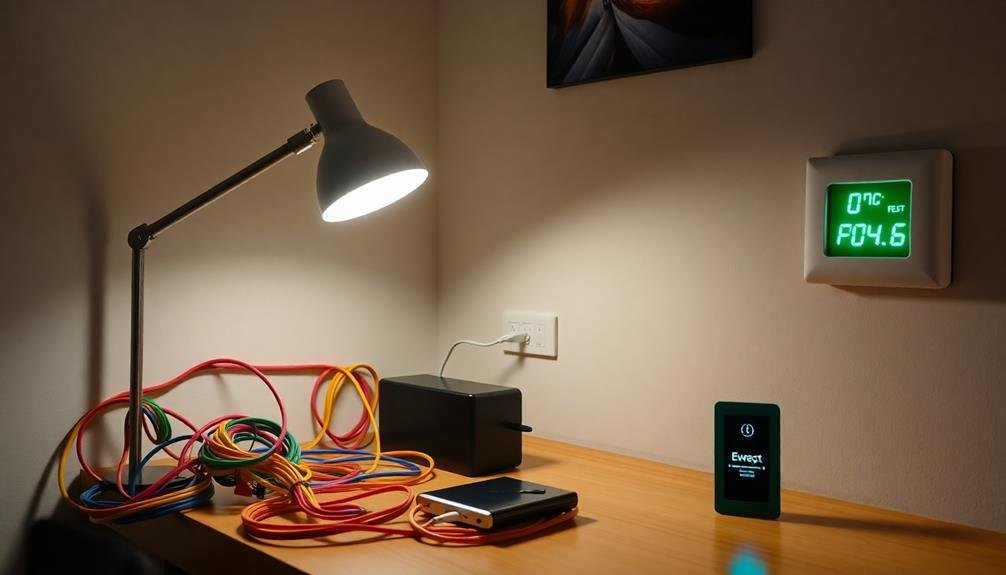Green water heating options offer compelling reasons to make the switch. You'll greatly reduce your home's carbon footprint and energy waste, as traditional heaters contribute heavily to greenhouse gas emissions. These eco-friendly alternatives, like solar and heat pump systems, can slash your energy bills by 50-80% annually. Government incentives and rebates make installation more affordable, while longer lifespans and minimal maintenance save you money in the long run. Many green heaters integrate with smart home systems for optimized efficiency. With environmental benefits, cost savings, and technological advancements, green water heating presents a sustainable solution for your home and wallet. Explore further to discover which option best suits your needs.
Environmental Impact of Traditional Heaters

The environmental impact of traditional water heaters is significant and often overlooked. When you use a conventional water heater, you're contributing to greenhouse gas emissions and energy waste. These systems typically rely on fossil fuels like natural gas or electricity generated from coal-fired power plants, releasing carbon dioxide and other pollutants into the atmosphere.
You'll find that traditional water heaters are often inefficient, wasting energy through standby heat loss. This occurs when heat escapes from the tank even when you're not using hot water. Additionally, these heaters consume a considerable amount of energy, accounting for about 18% of your home's total energy use.
The manufacturing process of traditional water heaters also takes a toll on the environment. It involves the extraction and processing of raw materials, which can lead to habitat destruction and pollution.
Moreover, when these heaters reach the end of their lifespan, they often end up in landfills, contributing to waste accumulation and potential soil and water contamination.
Cost Savings Over Time
While the environmental benefits of green water heating options are compelling, you'll find that the financial advantages are equally impressive. Over time, these eco-friendly systems can lead to significant cost savings on your energy bills.
Initially, you'll face higher upfront costs when installing solar water heaters or heat pump systems. However, these expenses are often offset by government incentives, tax credits, and rebates designed to encourage green technology adoption.
The real savings become apparent in the long run. Solar water heaters, for instance, can reduce your water heating bills by 50-80% annually. Heat pump water heaters are similarly efficient, using up to 60% less energy than traditional electric models.
Even tankless water heaters, while not as green as solar options, can cut energy consumption by 30% compared to conventional storage tank heaters.
You'll also benefit from reduced maintenance costs and longer system lifespans. Most green water heating options have fewer moving parts and are built to last, often outliving traditional systems by several years.
This durability translates to fewer replacements and repair expenses over time, further enhancing your overall savings.
Government Incentives and Rebates

You'll find various government incentives that can greatly make green water heating options more affordable.
Available tax credits at the federal level can considerably reduce your initial investment in energy-efficient systems.
Additionally, many states offer their own rebate programs, which you can combine with federal incentives to maximize your savings on eco-friendly water heaters.
Available Tax Credits
Numerous government incentives and rebates are available to homeowners who choose to install green water heating systems. Among these, tax credits stand out as a notable financial benefit. The federal government offers a 30% tax credit for solar water heaters through the Residential Renewable Energy Tax Credit program. This credit applies to both the equipment and installation costs, with no upper limit.
You'll also find state-specific tax credits that can further reduce your expenses. For example, some states offer additional credits ranging from $1,000 to $5,000 for solar water heater installations. Heat pump water heaters may qualify for credits of up to $300 in certain states.
To claim these credits, you'll need to file specific forms with your tax return, such as Form 5695 for the federal credit. Keep all receipts and certification statements from your installer as proof of purchase and eligibility.
It's essential to acknowledge that tax credits have expiration dates, so you should check the current status and deadlines before making your purchase. By taking advantage of these available tax credits, you can meaningfully offset the initial cost of your green water heating system.
State-Specific Rebate Programs
Beyond federal tax credits, many states offer their own rebate programs to encourage the adoption of green water heating technologies. These programs vary widely regarding eligibility criteria, rebate amounts, and specific technologies covered. You'll need to research the options available in your state to take full advantage of these incentives.
Some states provide cash rebates for installing solar water heaters, heat pump water heaters, or high-efficiency tankless systems. Others offer low-interest loans or property tax exemptions for green water heating upgrades. To find out what's available in your area, check your state's energy office website or contact your local utility company.
Here's a quick overview of rebate programs in three states:
| State | Rebate Type | Amount |
|---|---|---|
| California | Cash rebate | Up to $4,000 |
| New York | Tax credit | 25% of cost, up to $5,000 |
| Texas | Utility rebate | Varies by provider |
Reduced Carbon Footprint
Green water heating options greatly reduce your carbon footprint compared to traditional systems. By choosing eco-friendly alternatives, you'll considerably decrease your household's greenhouse gas emissions.
Solar water heaters, for instance, rely on renewable energy from the sun, eliminating the need for fossil fuels. Heat pump water heaters are another efficient option, using electricity to transfer heat from the air or ground to warm your water.
Tankless water heaters also contribute to a reduced carbon footprint by heating water on demand, avoiding the energy waste associated with constantly maintaining a large tank of hot water. These systems can cut your water heating energy consumption by up to 34%.
If you opt for a condensing water heater, you'll benefit from its ability to capture and use heat that would otherwise be lost through exhaust gases.
Solar Water Heating Systems

Solar water heating systems harness the sun's energy to provide hot water for your home. These systems typically consist of solar collectors, a storage tank, and a heat transfer fluid. As sunlight hits the collectors, it heats the fluid, which then transfers the heat to your water supply.
You'll find that solar water heaters can notably reduce your energy bills and environmental impact.
There are two main types of solar water heating systems: active and passive. Active systems use pumps to circulate water or heat transfer fluid, while passive systems rely on natural convection. Both can be effective, depending on your climate and water usage needs.
Here's why you should consider a solar water heating system:
- Lower energy bills: You'll save money on electricity or gas costs
- Reduced carbon footprint: Solar energy is clean and renewable
- Long-term investment: Systems can last 20+ years with proper maintenance
- Increased home value: Solar installations often boost property values
While the initial installation cost may be higher than traditional water heaters, the long-term savings and environmental benefits make solar water heating systems an attractive option for many homeowners.
You'll enjoy hot water while reducing your reliance on fossil fuels and contributing to a greener future.
Heat Pump Water Heaters
A technological marvel in the world of water heating, heat pump water heaters offer an energy-efficient alternative to traditional systems. These innovative devices work by extracting heat from the surrounding air and transferring it to the water in the tank. This process is similar to how a refrigerator operates, but in reverse.
You'll find that heat pump water heaters can be two to three times more efficient than conventional electric water heaters. They're particularly effective in warm climates, where they can draw heat from the abundant ambient air. In cooler regions, they may need to work harder, but they still offer significant energy savings.
When you install a heat pump water heater, you'll notice a reduction in your energy bills. While the initial cost might be higher than traditional models, the long-term savings make them a smart investment.
They also have the added benefit of dehumidifying the space around them, which can be useful in basements or garages.
You should consider the space requirements, as heat pump water heaters need adequate airflow to function effectively. They're an excellent choice if you're looking to reduce your carbon footprint and save money on water heating costs.
Tankless Water Heaters

Tankless water heaters offer you on-demand hot water without the need for a storage tank.
You'll appreciate their space-saving compact design, which can free up valuable room in your home.
These units operate efficiently by heating water only when you need it, potentially reducing your energy consumption and costs.
On-Demand Hot Water
One of the most efficient green water heating options is the on-demand or tankless water heater.
These systems heat water directly as it flows through the unit, eliminating the need for a storage tank. You'll enjoy hot water on demand without wasting energy to keep a large tank of water hot at all times.
Tankless water heaters offer several advantages over traditional systems:
- Energy efficiency: They only heat water when you need it, reducing standby energy losses.
- Space-saving design: Without a bulky tank, they can be installed in compact spaces.
- Longevity: They typically last longer than conventional water heaters, with a lifespan of up to 20 years.
- Endless hot water: You'll never run out of hot water during long showers or when running multiple appliances.
Space-Saving Compact Design
Space-saving benefits of tankless water heaters extend beyond energy efficiency. These compact units can free up valuable floor space in your home, especially if you're replacing a bulky traditional tank heater.
You'll find that tankless models are typically wall-mounted, taking up minimal room and allowing you to reclaim that extra closet or corner for storage or other purposes.
In smaller homes, apartments, or tiny houses, every square foot counts. A tankless water heater's slim profile means you can install it in tight spaces, such as under sinks, in crawl spaces, or even outdoors with proper weatherproofing.
This flexibility in placement allows for creative solutions to maximize your living area.
You'll also appreciate the sleek, modern look of tankless units compared to their tank counterparts. They blend seamlessly into your home's decor, and some models even come with stylish cover plates to further enhance their appearance.
Energy-Efficient Operation
Energy efficiency stands at the forefront of tankless water heaters' advantages. Unlike traditional storage tanks that constantly heat and reheat water, tankless systems only operate when you need hot water. This on-demand functionality considerably reduces energy consumption and lowers your utility bills.
You'll appreciate the precise temperature control offered by tankless heaters. They deliver a consistent flow of hot water at your desired temperature, eliminating the need for mixing with cold water to achieve the right balance. This feature not only enhances comfort but also contributes to energy savings.
Consider these key benefits of tankless water heaters' energy-efficient operation:
- Lower energy bills due to reduced standby heat loss
- Longer lifespan compared to traditional tanks, reducing replacement costs
- Potential eligibility for energy tax credits or rebates
- Reduced carbon footprint, supporting environmental sustainability
Geothermal Water Heating Options
Geothermal water heating systems harness the Earth's natural heat to warm your home's water supply. These systems use a ground-source heat pump to extract heat from the earth and transfer it to your water. The process is highly efficient, as the ground temperature remains relatively constant year-round, regardless of outdoor air temperatures.
There are two main types of geothermal water heating systems: closed-loop and open-loop. Closed-loop systems circulate a heat-transfer fluid through underground pipes, while open-loop systems pump groundwater directly through the heat exchanger. Both types can be installed horizontally or vertically, depending on your property's characteristics.
You'll benefit from significant energy savings with geothermal water heating, as these systems can be up to 400% efficient. They're also environmentally friendly, producing no direct emissions. While the initial installation cost is higher than conventional water heaters, you'll recoup your investment through lower energy bills over time.
Geothermal systems require minimal maintenance and have a long lifespan, often lasting 20-25 years for indoor components and 50+ years for underground loops. They're particularly suitable for new construction or major renovations, but can also be retrofitted to existing homes with proper planning.
Energy Star Certification Explained

While geothermal systems offer impressive efficiency, they're not the only eco-friendly water heating option available. Energy Star certification provides a reliable guide for choosing environmentally friendly and energy-efficient water heaters. You'll find this certification on various types of water heaters, including electric, gas, and heat pump models.
Energy Star certified water heaters must meet strict energy efficiency guidelines set by the U.S. Environmental Protection Agency and the Department of Energy. These units typically use 10-50% less energy than standard models, depending on the technology. By choosing an Energy Star certified water heater, you're not only reducing your carbon footprint but also saving money on energy bills.
Here's what Energy Star certification means for you:
- Lower energy consumption and reduced greenhouse gas emissions
- Significant cost savings over the lifespan of the water heater
- Rigorous third-party testing to validate performance claims are accurate
- Access to potential rebates and incentives from utility companies or government programs
When shopping for a new water heater, look for the Energy Star label to guarantee you're getting a high-efficiency unit that meets or exceeds federal standards. This certification simplifies the process of choosing an eco-friendly water heating option that aligns with your sustainability goals.
Installation Considerations for Green Heaters
When considering green water heaters, you'll need to decide between professional and DIY installation options.
Your choice may depend on your skill level, local regulations, and the complexity of the system you've selected.
Additionally, you'll want to carefully assess the space and location requirements for your new green heater, as some systems may need more room or specific positioning for peak performance.
Professional Vs DIY Installation
Deciding between professional and DIY installation for your green water heater can greatly impact its efficiency and longevity.
Professional installation guarantees proper setup, adherence to local codes, and peak performance. However, it comes with higher upfront costs.
DIY installation can save you money initially but requires technical knowledge and may void warranties if done incorrectly.
If you're considering DIY installation, assess your skills honestly.
Solar water heaters and heat pump systems are complex and often require specialized tools.
Tankless and hybrid electric heaters are generally easier to install but still demand careful attention to detail.
Remember, improper installation can lead to poor performance, increased energy consumption, and potential safety hazards.
Consider these factors when choosing between professional and DIY installation:
- Complexity of the system
- Your technical expertise and available time
- Local building codes and permit requirements
- Warranty implications
Ultimately, the decision depends on your comfort level with home improvement projects and the specific green water heater you've chosen.
If you're unsure, it's often best to invest in professional installation to guarantee your green water heater operates safely and efficiently for years to come.
Space and Location Requirements
For green water heaters, space and location requirements play an important role in installation and performance.
You'll need to take into account both indoor and outdoor placement options, depending on the type of system you choose. Solar water heaters typically require roof space for collectors and a sunny location to maximize efficiency. Heat pump water heaters need sufficient air space around them to draw heat from the surrounding environment.
When installing a tankless water heater, you'll save significant space compared to traditional tank models. However, you'll need to guarantee proper ventilation and access to gas lines or electrical connections.
For geothermal systems, you'll require adequate outdoor space for ground loops or access to a water source.
Indoor installations often necessitate reinforced flooring to support the weight of tank-based systems. You should also take into account proximity to bathrooms and kitchens to minimize heat loss through pipes.
Proper insulation and weatherproofing are vital for outdoor installations to protect against the elements and maintain efficiency.
Always check local building codes and zoning regulations before finalizing your green water heater's location, as some areas may have specific requirements or restrictions.
Maintenance and Longevity

Most green water heating systems require minimal maintenance, contributing to their long-term cost-effectiveness.
You'll find that solar water heaters and heat pump water heaters typically last 15-20 years, while tankless systems can function for up to 20 years with proper care.
This longevity greatly outpaces traditional tank water heaters, which often need replacement after 10-15 years.
To guarantee your green water heating system operates at peak efficiency and lasts as long as possible, you should:
- Schedule annual professional inspections to catch potential issues early
- Clean or replace filters regularly, following manufacturer guidelines
- Flush the system periodically to remove sediment buildup
- Monitor system performance and address any unusual noises or changes in efficiency promptly
Compatibility With Smart Home Systems
As technology continues to advance, green water heating options are increasingly integrating with smart home systems. You'll find that many eco-friendly water heaters now come with built-in Wi-Fi connectivity, allowing you to control and monitor your system remotely through smartphone apps. This integration offers you unprecedented convenience and energy-saving potential.
With smart home compatibility, you can easily adjust water temperature, set schedules, and receive maintenance alerts from anywhere. Some systems even learn your household's hot water usage patterns and optimize heating accordingly. You'll appreciate the ability to preheat water before you arrive home or turn off the system when you're away for extended periods.
Many green water heaters can also connect to broader smart home ecosystems, working in tandem with other devices. For instance, they can communicate with solar panels to maximize the use of renewable energy or sync with smart thermostats for more efficient whole-home energy management.
As an added benefit, these smart features often provide detailed energy consumption data, helping you track and further reduce your environmental impact while saving on utility bills.
Future of Green Water Heating

While green water heating technology has made significant strides, the future promises even more exciting innovations. You'll soon see advancements in efficiency, integration, and sustainability that'll revolutionize how you heat water in your home.
Expect to see improvements in heat pump technology, making them even more efficient and suitable for colder climates. Solar thermal systems will become more affordable and easier to install, allowing more homeowners to harness the sun's energy.
You'll also witness the rise of smart, AI-driven water heaters that'll optimize energy usage based on your habits and preferences.
The future of green water heating will likely include:
- Nanotechnology-enhanced solar collectors for improved heat absorption
- Hybrid systems combining multiple renewable energy sources
- Self-healing materials for longer-lasting, maintenance-free heaters
- Advanced thermal storage solutions to maximize energy capture and use
As green water heating technology continues to evolve, you'll find it easier and more cost-effective to reduce your carbon footprint while enjoying reliable hot water.
Keep an eye on these developments to stay ahead of the curve and make informed decisions about your home's energy future.
Frequently Asked Questions
How Noisy Are Green Water Heating Systems Compared to Traditional Ones?
You'll find that green water heating systems are generally quieter than traditional ones. They often use advanced insulation and newer technologies that reduce operational noise. Some, like solar water heaters, can be nearly silent during use.
Can Green Water Heaters Be Used in Areas With Hard Water?
Yes, you can use green water heaters in hard water areas. However, you'll need to take extra precautions. Install a water softener or descaler to prevent mineral buildup, and perform regular maintenance to guarantee peak performance and longevity.
Are There Any Health Benefits Associated With Using Green Water Heaters?
You'll enjoy health benefits from green water heaters. They reduce exposure to harmful emissions and contaminants found in traditional systems. You're less likely to inhale pollutants, and you'll have cleaner, safer water for your daily use.
How Do Green Water Heaters Perform During Power Outages?
You'll find green water heaters perform differently during outages. Solar and heat pump models won't work without electricity. However, tankless gas heaters and solar thermal systems can still provide hot water, ensuring you're not left in the cold.
Can Green Water Heaters Be Integrated With Existing Plumbing Systems?
You'll be pleased to know that green water heaters can often be seamlessly integrated with your existing plumbing. They're designed to work with standard pipes and fittings, making installation straightforward. You'll just need a professional to guarantee proper connections.
In Summary
You've seen the many benefits of green water heating options. They're not just good for the environment, but also your wallet. With cost savings, incentives, and reduced carbon emissions, it's a smart choice. Whether you opt for solar or other eco-friendly systems, you'll be investing in a sustainable future. As technology advances, green water heating will only become more efficient and accessible. Make the switch today and enjoy the rewards for years to come.





Leave a Reply